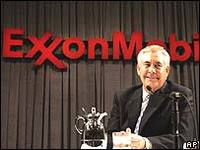Here's sobering thought: Even Exxon agrees global warming exists
February 18, 2007
Global climate change is, in fact, a complex subject, and there are no easy, quick-fix solutions. But it is real. Slowly, though, progress is being made, for the first step toward sobriety is admitting there's a problem.
Written by the Editorial Board, Austin American-Statesman

Exxon Mobil CEO Rex Tillerson
"Hi. I'm Exxon Mobil, and I contribute to global warming."
Rex Tillerson, chief executive officer of Exxon Mobil Corp., didn't put it that way in publicly acknowledging last week that global warming exists and that industrial and consumer use of his company's product, petroleum, is helping to raise Earth's temperature. But his speech, given at an energy conference in Houston rather than in group therapy, was still significant.
Based in Irving, Exxon Mobil earned a record $39.5 billion profit last year and has been among the biggest skeptics about global warming. So when the company's chairman and chief executive publicly acknowledges that the climate is changing and that the world needs to do something about it, the problem is probably far worse than we think.
Tillerson has not turned into a tree-hugger, though. In a news conference after his speech, Tillerson endorsed TXU Corp.'s plan to build 11 coal-fired power plants in Texas because, he said, they will be needed to meet this state's growing demand for electricity.
The burning of coal by power plants, like the burning of gasoline by cars and trucks, releases carbon dioxide into the atmosphere. The steady build-up of carbon dioxide is trapping heat near the Earth's surface that otherwise would emanate into space, most climate scientists say. That rising heat, the scientists add, accounts for the melting of glaciers, big chunks of the Arctic and Antarctic ice sheets, mountain icecaps and the like.
Tillerson said the "risks to society and ecosystems from climate change could prove to be significant," so it would be "prudent" to use "sensible strategies" to reduce those risks without harming "economic development, poverty eradication and public health."
And, he said, the petroleum industry has a responsibility to contribute to the debate about what to do "and to take concrete actions ourselves to reduce emissions."
But no need to rush. What's required, Tillerson said, is more research and "a global approach" to develop market-based solutions that keep in mind the need for "affordable, reliable energy."
Texans can rest assured that there's no panic in our governor's office, which seems to regard global warming as a nuisance on the order of, say, roadside litter.
Asked whether Gov. Rick Perry thought global warming was real and, if so, if it is a problem, a spokesman seemed befuddled by the question: "Let me call you right back. Sounds like I need to have a conversation with the boss."
The next day, the spokesman said the governor agrees that global warming is real but is not convinced that human activity is causing it.
Most important, the spokesman said, the governor will not "unilaterally disarm" the Texas economy by seeking restrictions on carbon emissions — on coal plants, for instance — that would leave it at a competitive disadvantage with other states. That, the spokesman said, is why any restrictions on carbon dioxide emissions must come at the national level.
Global climate change is, in fact, a complex subject, and there are no easy, quick-fix solutions. But it is real. Slowly, though, progress is being made, for the first step toward sobriety is admitting there's a problem.
![]()
![]()
Related Stories
![]()
Fair Use Notice
This site contains copyrighted material the use of which has not always been specifically authorized by the copyright owner. We are making such material available in our efforts to advance understanding of environmental, political, human rights, economic, democracy, scientific, and social justice issues, etc. We believe this constitutes a "fair use" of any such copyrighted material as provided for in section 107 of the US Copyright Law. In accordance with Title 17 U.S.C. Section 107, the material on this site is distributed without profit to those who have expressed a prior interest in receiving the included information for research and educational purposes. For more information go to: http://www.law.cornell.edu/uscode/17/107.shtml. If you wish to use copyrighted material from this site for purposes of your own that go beyond "fair use", you must obtain permission from the copyright owner.